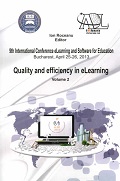LET'S PLAY AS ARCHITECTS IN THE CITY! USE OF MOBILE TECHNOLOGIES DURING THE PILOT PHASE
LET'S PLAY AS ARCHITECTS IN THE CITY! USE OF MOBILE TECHNOLOGIES DURING THE PILOT PHASE
Author(s): Cătălina Hygum Ulrich, Anca NedelcuSubject(s): Education
Published by: Carol I National Defence University Publishing House
Keywords: mobile technologies; project-based learning; urban education
Summary/Abstract: The paper critically examines the experience in implementing an innovative pilot project from students and learning facilitators' perspective. It highlights examples of modeling innovative practice through research and teaching with emergent technologies in a frame of Let's play as architects in the city! project launched in 2012 as optional subject-matter for the third and fourth grade of elementary school. Developed by a group of architects (Grupul De-a arhitectura) and implemented in partnership with the University of Bucharest and Architects' Order, the project has an interdisciplinary approach and involves architects, teachers and University faculty and students. Project aims to make primary school students acquainted with basic concepts from architecture and urbanism by direct observation, neighborhood exploration and creative use of data gathered through a variety of ICT tools. Firstly the paper explores young students' textual engagements with mobile technologies and the changing nature of literacy in the context of being involved in an engaging complex activity. Project activities provide contextual learning experiences and rich exploration and discovery of the connected nature of information in the real world. Specific assignments reinforce skills development, use of mobile technologies and articulation to school curriculum: reading, writing, math, technological education, civic participation, arts and digital skills. Secondly the paper investigates the perceptions of learning facilitators' on the use of mobile technology for project implementation. Architects and teachers will provide narrative information on the balance between planned and unplanned in using new technology for classroom and outdoor activities with elementary school students, between types of emerging collaboration encouraged by use of mobile technologies. Instructors will reflect not only on strengths but also on the challenges in implementing this integrative learning approach. Thirdly, the evaluation of project implementation during the pilot phase will allow changes aiming at making of the extended phase a platform of quality education. Experiences gained in the frame of Let's play as architects in the city! could provide genuine examples about ubiquitous learning, where learning opportunities and experiences are dramatically changing (Burbules). Therefore we expect to stimulate research efforts that focus on key areas like mobile learning, new literacies (e-texts) and engaging faculty and students in the pursuit of digital perspectives to research and teaching.
Journal: Conference proceedings of »eLearning and Software for Education« (eLSE)
- Issue Year: 9/2013
- Issue No: 02
- Page Range: 167-172
- Page Count: 6
- Language: English

